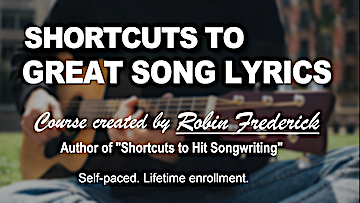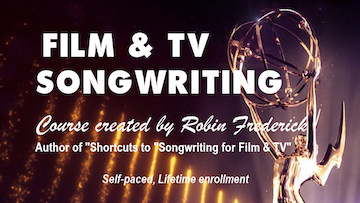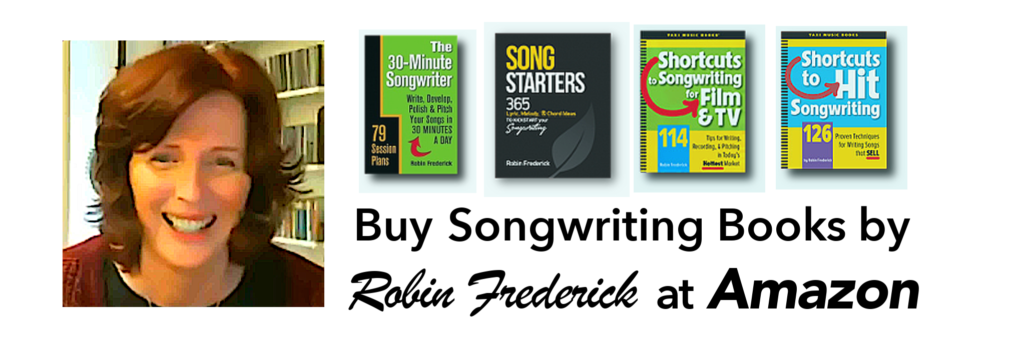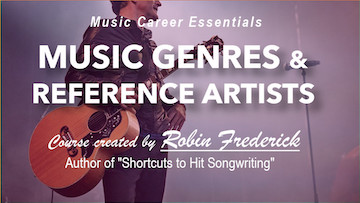
Seems I’ve heard from a lot of songwriters and composers lately who are feeling frustrated. Their careers haven’t gotten off the ground or they’re stalled at a level that isn’t really satisfying.
Over and over, I hear things like…
- I’m not getting the kind of response from the music industry I deserve.
- I spend hours on my music but I’m not making any money.
- They keep telling me my music is dated.
- I’m doing the best I can. I guess I just don’t have enough talent.
I know how awful it feels to be in that place. But there’s really a very straightforward process for getting beyond these problems and finding success in the music industry. Know what the industry needs and give it to them! It takes focus and determination. But If you’re willing to do that then you can get where you want to go.
So let’s cut to the chase…
Everything you need to know to be a successful songwriter is right in front of you.
If you study successful songs and instrumentals and use them to help you discover new techniques and choices to use in your own songs, you’ll break through.
Once you know what’s working for today’s listeners and the music industry and you can create original, authentic material in one of these styles, you’ll find you have an open door into the offices of music publishers and Film/TV music supervisors.
They need this music and you’d be surprised how many ways there are to get it to them. But you need to have the goods first, before you approach them.
Listen to, study, and analyze what works
There are probably other ways to build a songwriting career but this one works whether you’re a band looking for a breakout single or a songwriter pitching to music publishers or an artist looking for placements in film & TV.
Study recent, successful songs!
I’m not talking about enjoying a song like the average listener does. Just listening is not enough. Listening like a pro means studying, analyzing, wringing every last bit of information out of that track. Here are a few things to listen for.
- Song structure: What is the song’s structure? Does it have a big chorus or a simple refrain line at the end of each verse? Is there a bridge?
- Lyrics: What kind of language does the lyric use? Is it conversational or poetic? What kinds of images and action words are used? How is the singer portrayed? What is the theme and how is it handled?
- Chord progression: What are the chords? Is it a generic progression or unique to the melody? Does the progression repeat a lot or a little?
- Melody: Do the phrases start on a variety of beats? Do you hear a lot of rhythmic interest in the melody? What kinds of melody patterns are being used?
Next, check out the vocal. Notice the singer’s attitude, mood, and personality. If you’re writing instrumental music or arranging the instrumental bed for a song, check out the arrangement. What instruments are playing? When do they come in and when do they drop out? (You can even chart this out and study it as I show you in Shortcut #73 of Shortcuts to Songwriting for Film & TV. )
Here are hit songs in a range of styles I’ve analyzed for you.
Immerse yourself in a music genre
Immersing yourself in a style or genre means listening to many songs or instrumentals, studying them, absorbing them, and getting a feel for the range of writing techniques. Listen for a couple of hours a week at least. Spend some focused time doing nothing but exploring new music you like. (Don’t spend time on the stuff you don’t like.)
Immersion can help speed up your songwriting process by giving you instant choices when writing and more confidence that what you’re choosing fits the needs of the style. The ability to turn out quality work on time and on target stylistically is an essential skill if you’re aiming to make money with your songwriting.
Learn to play and sing recent, successful songs
This is a great way to truly immerse yourself in a genre. When you physically play and sing a song you embed it in your body and brain. Do this with a number of songs to reinforce the style and create new options and habits that can keep you on track and cut down the time it takes to write new material.
If you write lyrics only and don’t play an instrument, use a Karaoke track to sing along with. Tap your foot in time as you sing. The point is to experience the physical feeling of the melody and the way it relates to the lyric phrases and the underlying beat.
Finding successful songs to study
So where do you find these successful songs? You don’t have to wade through hours of annoying Top 40 radio. Music charts, music blogs, playlists and pitch sheets are readily available and many are free. Here’s a list that will give you five options. Be sure to check them out: Where to find successful songs and instrumentals to study.
It’s not about copying someone else
When I suggested this process of studying and immersion to someone recently, his response was: “But I don’t like to copy.” This isn’t copying. This is learning and practicing what works. Then you can make it your own. If you play guitar, you probably learned licks by playing along with your favorite records. After you mastered those licks, you played them differently, created variations, and made up your own licks based on them. This is the same idea applied to songwriting.


Creatively use what you learn. Run it through your own filter. Play with it. Get in the sandbox and mess around. Using an existing song or instrumental cue to help you find the target is only the start. It’s what you do with what you learn that counts. Just for fun, try writing a song “in the style of…” one of the hits you’ve studied.
Inspiration still plays a big role!
None of this means you should turn your back on inspiration. Opening up to spontaneous emotions and ideas is where new songs start and it’s what motivates you to write in the first place. Never lose that. Songs still begin in the heart and they always will.
But learning what works for music users can help you decide which songs to spend time and money developing. Resources are limited and you want to spend yours on those songs that have the best chance of being successfully pitched. Save the others for family and friends.
Take the time
Doing all this listening, studying, and practicing takes time. I know you’d rather be writing your own songs than studying someone else’s. (I sure would.) But in many ways it’s as much a part of songwriting as composing new tunes and writing lyrics. It’s your source for new techniques and current ideas.
Make it the first thing you do before you start a songwriting session. If you’ve got a day job or you’re in school, set aside time in the evenings and on weekends to listen, study, play and sing recent, successful songs you like. These are your teachers, your mentors, and even, in a way, your co-writers. Once you start, you’ll see the way forward begin to open up.
Find out how to use 30-minute songwriting workouts to write faster & batter!
Related: What to Do AFTER You Write Your Song
by Robin Frederick


